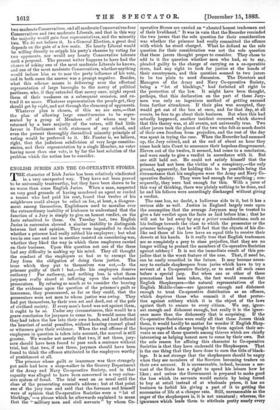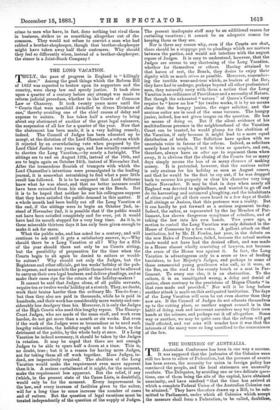ENGLISH JURIES AND THE CO-OPERATIVE STORES. T HE character of Irish
Juries has been relatively vindicated in a very unexpected way. They have not been proved to be universally trustworthy, but they have been shown to be no worse than some English Juries. When a man, suspected on very good grounds of having murdered an agent or carded a tenant who had paid his rent, found that twelve of his neighbours could always be relied on for, at least, a disagree- ment among themselves, Englishmen used to moralise over the extraordinary inability of Irishmen to understand that the function of a Jury is simply to give an honest verdict, on the facts submitted to them. On Tuesday last, two English Juries in succession showed a similar inability to distinguish between fact and opinion. They were impanelled to decide whether a prisoner had really robbed his employers ; but what two in one case and one in another insisted on considering was, whether they liked the way in which these employers carried on their business. Upon this question not one of the three had any difficulty in making up his mind. They all thought the conduct of the employers so bad as to exempt the Jury from the obligation of doing them justice. The issue which they put to themselves was not,—Is the prisoner guilty of theft I but,—Do his employers deserve outlawry ? For outlawry, and nothing less, is what these jurymen really aimed at inflicting upon the unfortunate prosecutors. By refusing so much as to consider the bearing of the evidence upon the question of the prisoner's guilt or innocence, they pronounced, so far as they could, that the prosecutors were not men to whom justice was owing. They had put themselves, by their own act and deed, out of the pale of civilised society. If every man's hand was not against them, it ought to be so. Under any circumstances, this would be a grave conclusion for jurymen to come to. It would mean that they had taken the law into their own hands, and had inflicted the heaviest of social penalties, without hearing counsel plead or witnesses give their evidence. When the real offence of the employers in question is taken into account, the marvel is still greater. We wonder not merely that two, if not three, jury- men should have been found to pass such a sentence without trial, but that two, if not three, jurymen should have been found to think the offence attributed to the employers worthy of punishment at all. The prisoner whose guilt or innocence was thus strangely put aside had been a shop-walker in the Grocery Department of the Army and Navy Co-operative Society, and in that capacity was alleged to have been concerned in a very exten- sive system of fraud. The trial went on as usual until the close of the prosecuting counsel's address ; but at that point one of the jury rose and said that the foreman and himself were of opinion that Co-operative Societies were a "lot of blacklegs,"—a phrase which he afterwards explained to mean that the " military men and civil servants " by whom Co- operative Stores are carried on " cheated honest tradesmen out of their livelihood." It was in vain that the Recorder reminded the two jurors that the sole question for their consideration was whether the prisoner had really committed the offence with which he stood charged. What he defined as the sole question for their consideration was not the sole question that these jurors thought proper to consider. They chose to add to it the question whether men who had, so to say, pleaded guilty to the charge of carrying on a co-operative store, had any right to look for justice at the hands of their countrymen, and this question seemed to two jurors to be too plain to need discussion. The Directors and Managers of the Army and Navy Co-operative Society, being a "lot of blacklegs," had forfeited all right to the protection of the law. It might have been thought, perhaps, that this declaration on the part of these Jury- men was only an ingenious method of getting excused from further attendance. If their plea was accepted, they would get out of the box at once, and for that day, at all events, be free to go about their business. But when this had actually happened, another incident occurred which showed that this theory was, at all events, not universally true. Two other jurors took the places of the two who felt so much doubt of their own freedom from prejudice, and the rest of the day was spent in trying the case. When the Recorder had summed up, the Jury retired, and at the end of about an hour they came back into Court to announce their hopeless disagreement. Eleven out of the twelve, it seemed, had come to a conclusion, and were ready to give a verdict in accordance with it. But one still held out. He could not satisfy himself that the prisoner had not been the victim of a conspiracy,—the only ground, apparently, for holding this to be possible being the circumstance that his employers were the Army and Navy Co- operative Society. They were bad enough for anything ; con- sequently, they were bad enough for this. With a juror of this way of thinking, there was plainly nothing to be done, and he and his fellows were accordingly discharged without giving a verdict.
The case has, no doubt, a ludicrous side to it, but it has a serious side as well. Justice in England largely rests upon the assumption that the average Juryman may be trusted to give a fair verdict upon the facts as laid before him ; that he will not be led away by any a priori considerations, such as his feelings towards the class to which the prosecutor or the prisoner belongs ; that he will feel that the objects of his dis- like and those of his love have an equal title to receive their deserts at his hands. Is it really true that English tradesmen are so completely a prey to class prejudice, that they are no longer willing to protect the members of Co-operative Societies against robbery I It is not the immediate result of this pre- judice that is the worst feature of the case. That, if need be, can be easily remedied in the future. It may become neces- sary to exclude shopkeepers from juries which have to try a servant of a Co-operative Society, or to send all such cases before a special jury. But when one or other of these precautions had been taken, the fact would remain that English Shopkeepers—the natural representatives of the English Middle-class—are ignorant enough and dishonest enough to treat Co-operative distribution as an offence, which deprives those who commit it of that protec- tion against robbery which it is the object of the laws against theft to ensure to every citizen. We say, ignor- ant enough and dishonest enough, but really it is the ignor- ance more than the dishonesty that is surprising. If the Co-operative Societies were really all that these Jurors think them, it would hardly be matter for wonder if English Shop- keepers regarded a charge brought by them against their ser- vants as one of those quarrels among thieves which are chiefly interesting as helping honest men to come by their own. But the sole reason for affixing this character to Co-operative Societies is that they have undersold the Shopkeepers. That is the one thing that they have done to earn the title of black- legs. It is not strange that the shopkeepers should be angry when they see members of the Services becoming traders on their own account. It is unreasonable, indeed, because a ser- vant of the State has a right to spend his leisure how he likes ; and unless the Government is prepared to make good the lose which its servants would sustain by being forced to buy at retail instead of at wholesale prices, it has no business to forbid his giving a part of it to getting the necessaries of life at a cheaper rate. Still, unreasonable as the anger of the shopkeepers is, it is not unnatural; whereas, the ignorance which leads them to attribute pretty nearly every
crime to men who have, in fact, done nothing but rival them in business, strikes us as something altogether out of the common. They would not refuse to convict a man who had robbed a brother-shopkeeper, though that brother-shopkeeper might have taken away half their customers. Why should they feel so differently when, instead of a brother-shopkeeper, the sinner Is a Joint-Stock Company











































 Previous page
Previous page